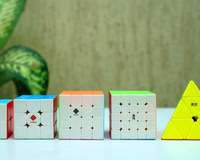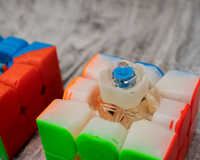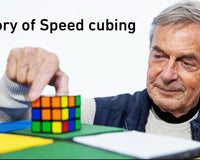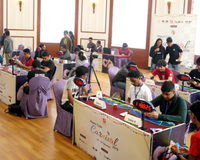All-Rounding
All-rounders in cubing are those speedcubers who have practiced every or most of the 17 events to a degree where they are generally considered “good at all events”. There can be lots of subjective definitions of all-rounders and some objective ones too that measure results and rankings. Some well-known all-rounders in the speedcubing sphere are Martin Vædele Egdal, Stanley Chapel, and Brendyn Dunagan.
Some subjective definitions include:
- Being good enough to be able to podium at multiple events at local competitions.
- Having a good national, continental or world ranking in multiple events.
- Being able to win the “Sum of ranks” first place award at local competitions.
The more objective ways to define an all-rounder are Sum of Ranks and KinchRanks:
Sum of ranks is simply the number you get after adding up a cuber’s world/continental/national rankings in single or average. The lower the number, the better your ranking as compared to other cubers.

The Top 10 Sum of Ranks in India as of 20/06/2023
Here is the site where you can check your Sum of Ranks.
The Kinch method is slightly more complex. To explain with an example, let’s say the world record for an event is 5.00 seconds and your personal best is 10.00 seconds. Since 5.00 is 50% of 10.00, your Kinch score for that particular event is 50.00. If you were to better your PR by getting a 7.50, then your new Kinch score would be 75.00. If you have never competed in an event, your Kinch score for that event will be zero. The average of all your Kinch scores (from all 17 events) is your official Kinch score.
Here is the site to check your KinchRank.
Below I will be listing some of my own thoughts on the kind of practice you can do to improve as an all-rounder:
1. Practice Methods:
One of the approaches you can take is practicing only one event (or a set of similar events) for a long period of time and getting very good at it. You then repeat this process for every event, one by one.
In my opinion, it is not the best idea to somehow practice all 17 events at once. You will not notice significant improvement in any event and the only benefit you might get from this sort of practice would be seeing no regression in your times.
2. Disliking Events:
There are almost always some events that you personally don’t like to practice and you do not find them fun. Well in that case, firstly you have to ask yourself if you really want to be an all-rounder. If yes, then are you willing to overcome the dislike for some events in order to achieve your goal? It’s very important to know what you want out of cubing as a hobby, and then do the right things to get there.
Personally, I love solving puzzles in general and that’s what keeps me interested in all-rounding. I still don’t enjoy big cubes very much because they take too long, but I do set aside some time to practice them anyway because my ultimate goal is to be a good all-rounder.
3. Algorithms

Don’t be afraid to learn algorithms. For a lot of events, the entry barrier to being world-class is learning a huge set of algorithms. For example, the CSP method in Square-1, the 3-style method for 3BLD, etc. You can start by tackling small sets of algorithms like CLL for 2x2 or full OLL for 3x3 if you haven’t done that already. You can find the best algorithms for these sets in the courses at X-skills.
Try to learn these algorithm sets in a shorter period of time than you normally would so that you can build your confidence with algorithms.
4. PR Streak:
As discussed in my previous blog about finding motivation, being an all-rounder gives you a better chance of maintaining a long PR streak since you can get PRs in multiple events instead of just one or two. Someone with the mindset of an all-rounder can always pick up a new event and get very good at it and break PRs easily.
5. Understanding Big Cubes:

As you may already know, practicing one big cube always translates to other big cubes. For example, 5x5 practice helps your 4x4, 6x6, and 7x7 and vice versa, and more so if you use the same method for all the events. I personally use Yau for all four big cubes.
So knowing this, you can set aside a few months where you only grind big cubes (5x5, 6x6, and 7x7 together, optionally 4x4 as well) and get really good at them.
6. Regression:
You may have noticed for some events your speed declines after a long time of not practicing it. As an all-rounder doing all events, this can be quite overwhelming. Of course, it is difficult to practice every event together but you can tackle it smartly.
You can do 12-15 solves of other events every few days while practicing an event or set of events. Keep in mind your knowledge and skill do not disappear if you don’t actively practice. It only takes some time to de-rust and get back to your original speed and improvement becomes easier from there on.
In conclusion, like all goals in cubing, becoming an all-rounder in cubing requires dedication and practice along with a willingness to overcome personal preferences. While there may be subjective and objective definitions of all-rounders, metrics such as Sum of Ranks and KinchRanks provide more concrete measures of proficiency across multiple events. To improve as an all-rounder, it is advisable to focus on one event or a set of similar events at a time, rather than attempting to practice all 17 events simultaneously. Overcoming dislikes for certain events is crucial for achieving the goal of being a well-rounded speedcuber. Learning algorithms is essential, as it often serves as the entry barrier to achieving world-class performance in various events. Additionally, being an all-rounder increases the likelihood of maintaining a long streak of personal records (PRs) across multiple events. Understanding the interplay between big cubes and practicing them collectively can also improve your all-rounding prowess. Managing regression by periodically incorporating solves of other events while practicing specific ones allows for skill retention and faster subsequent improvement.
That is all I have for this blog, hope it helps!
About Author

Shubham Maharana
Shubham Maharana is an all-rounding speedcuber from Mumbai. He is currently ranked 2nd for 2x2 Single and 7th for Sum of Ranks in India. He started cubing 8 years ago at the age of 9 and attended his first competition at 11. He was one of India’s Youngest Competition Organizers at the age of 14. He has won 23 WCA medals across 6 events.
Apart from Cubing, Shubham enjoys playing the piano, listening to music, and writing.
































